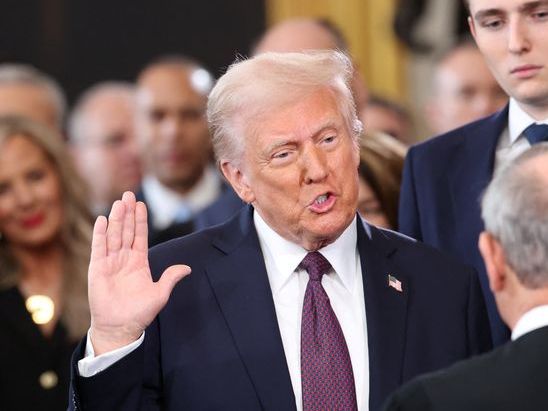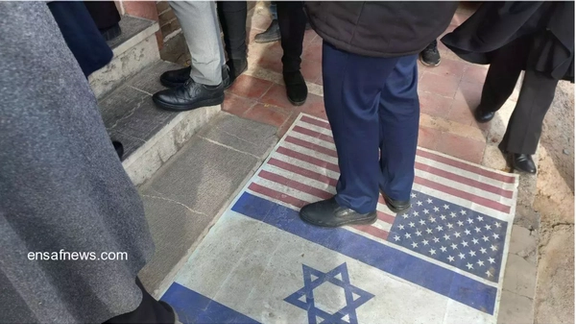Pezeshkian government makes detente overtures as Trump takes office

The administration of Iran's president Masoud Pezeshkian's has hinted at willingness to engage with US under Donald Trump and to open Iranian markets to US companies.

The administration of Iran's president Masoud Pezeshkian's has hinted at willingness to engage with US under Donald Trump and to open Iranian markets to US companies.
In a recent interview with NBC, President Pezeshkian stressed Tehran's readiness for dialogue with the US, while also stating that the Islamic Republic had no intentions of assassinating Donald Trump over the 2020 killing of the IRGC's Qasem Soleimani in Baghdad.
A senior aide to Pezeshkian, Ali Abdolalizadeh, claimed on Saturday that an agreement with the Trump administration could be reached within two or three months.
Recently, the Pezeshkian administration also undertook what some described as goodwill gestures, such as the offer to assist in controlling the wildfires in Los Angeles.
Ensaf News, a reformist outlet highly supportive of Pezeshkian, reported last week that the US and Israeli flags, which were painted on the ground for people to step on as they entered the presidential compound, were removed “several weeks ago.”

Khamenei repeats opposition to 'hostile' US
In his speech on December 30, Supreme Leader Ali Khamenei reiterated that the US remains “hostile” to Iran and urged the nation to remain “a thousand times more vigilant”.
Khamenei advised against surrendering to American demands but did not explicitly address the prospect of negotiations with the US or the European parties to the nuclear deal.
As the government’s overtures grow, ultra-hardliners continue to highlight Khamenei’s past objections to negotiation with the US in general and with the Trump administration in particular, while also reiterating threats of avenging him for Soleimani's killing.
Is the government acting against Khamenei’s wishes?
The Pezeshkian administration’s moves appear at odds with Khamenei’s repeated declarations that the Islamic Republic would not engage with the Trump administration and his vow to avenge Soleimani’s assassination.
Notably, Khamenei refused to respond to a 2019 message from Trump delivered by then-Japanese Prime Minister Shinzo Abe.
Many Iranian analysts and politicians, however, argue that the Pezeshkian government could not proceed with such overtures without the Supreme Leader’s tacit approval.
For instance, the reformist newspaper Ham-Mihan accused state-run media outlets, such as Kayhan and the state broadcaster (IRIB), of portraying negotiations with the Trump administration as a "thick red line" after the US elections in November 2024.
“But the circumstances and a review of the positions and reactions show that this red line has long been gone and Iran does not rule out negotiations with the future US administration,” Ham-Mihan wrote.
Similarly, Ensaf News interpreted Pezeshkian’s remarks in the NBC interview as evidence that he has already received the green light to proceed with his plans to engage with the new US administration.
Pezeshkian signals the possibility of economic cooperation with the West
During Pezeshkian's interview with NBC, he also referred to the signing of a strategic cooperation agreement with Russia, suggesting that this did not mean the exclusion of the West in Iran's relations.
“We are going to sign a strategic agreement with Russia, the same ways as we did with China, and the same ways as we requested to have [one] with Europe … This does not just apply to Russia, we are prepared to sit down and sign this [type] of agreement with all countries that want to have a close, reasonable, and mutual agreement,” he said.
Foreign Minister Abbas Araghchi has also emphasized that the nature of the agreement with Russia was “primarily economic” and Kazem Jalali, Iran's ambassador to Moscow, has said that Iran “is not interested in joining any [Eastern or Western] blocs.”
Unlike agreements that Moscow has signed with Pyongyang and Minsk, Tehran’s deal with Moscow, very notably, did not include a mutual defense clause.
However, Iran has been supplying thousands of suicide drones and allegedly missiles to Russia that have been extensively used to target civilians and civilian installations in Ukraine since mid-2022.
But in the past few months, Iran's deep economic crisis compounded by sanctions Trump imposed in his first term, has become more serious, with its national currency losing 30% of its value since August. More officials and commentators allowed to speak in public have been calling for negotiations with the US.
Pezeshkian’s aide, Abdolalizadeh, has argued that Iran should not have excluded the US from its economic dealings with the international community after the conclusion of the 2015 nuclear deal known as the JCPOA (Joint Comprehensive Plan of Action).
“After the JCPOA, we allowed all countries to cooperate with Iran, but we blocked the Americans, and this raised the question of why the US was not allowed to be in Iran for economic cooperation?” he said, adding that the Obama team did not make their complaint public, but Trump would not tolerate such exclusion. “He said he would rip the JCPOA and we said we would burn it. Both sides regret it now.”
He added that, if sanctions are lifted, Iran's oil and gas sectors could become attractive opportunities for American and multinational companies.
Former Iranian diplomat and Princeton professor Hossein Mousavian also suggested in a recent opinion piece for The Hill that direct talks with the US, even at the presidential level, are no longer off-limits.
Mousavian, often labeled a "loyal regime insider" by the Iranian diaspora in the West, proposed that a potential agreement could pave the way for significant economic cooperation, with projects valued in the hundreds of billions of dollars across industries such as petrochemicals, aviation, and clean energy.
Navigating between East and West
Pundits in Iran say the Pezeshkian administration’s overtures to the new US administration, along with its efforts to avoid appearing overly eager to align with Moscow or Beijing, should be viewed through the lens of a ‘positive balancing’ foreign policy.
This approach contrasts with the traditional “Neither East nor West” slogan inscribed at the entrance of the foreign ministry building in central Tehran.
“This strategy neither accepts isolationism nor unquestioning submission to the demands of others,” political analyst Reza Raisi said in an article published by the reformist Ham-Mihan newspaper.